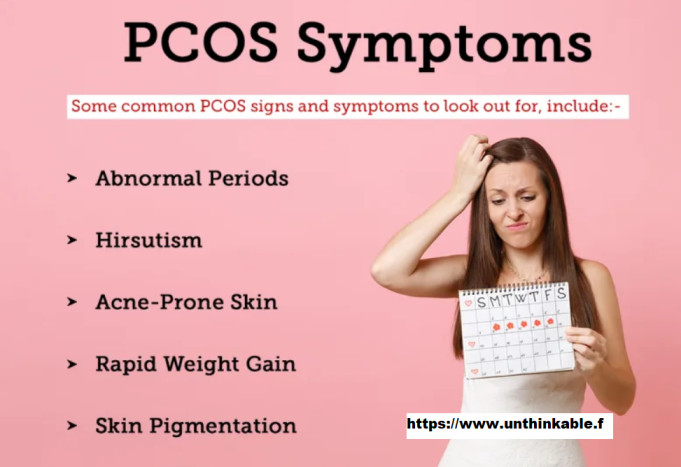[ad_1]
PCOS, or polycystic ovarian syndrome, is a prevalent hormonal condition in women. It is characterized by the ovaries’ high androgen production. Androgens are normally in minute levels in women. The rise generates numerous health issues and significant hazards for PCOSCO patients.
Polycystic ovary syndrome is when the ovaries get a lot of small cysts. Fluid is inside these cysts.
Some PCOSCO women do not have cysts.
When an egg is released from an ovary, this is called ovulation. So that a male sperm can fertilize it, this happens.
If the egg is not fertilized, it leaves the body when a woman has her period.
In very rare cases, a woman may not make enough hormones to be able to ovulate. When a woman doesn’t ovulate, her ovaries might make a lot of small cysts. Androgens, which are male hormones, are made by these cysts. Women with PCOS often have a lot of androgens in their bodies. It causes periods that aren’t regular and other problems related to PSOCSO.
Let’s talk more about PCOS so you can learn more about it.
What does polycystic ovary syndrome mean?
PCOS affects about half a million women of reproductive age in the United States, making it one of the most common endocrine illnesses. It is distinguished by larger, fluid-filled sacs on the ovaries known as cysts, which can cause infertility and other reproductive difficulties in women.
This illness is frequently linked to other conditions like insulin resistance, obesity, and type 2 diabetes.
These comorbid disorders are thought to contribute to the development and severity of PCOS.
This illness can be difficult to identify since it frequently mimics other health issues. Your doctor will undertake a physical exam and may prescribe tests to look for hormonal irregularities to establish whether you have it. If you have PCOS, your doctor may advise you on therapies to alleviate your symptoms.
What Are the Significance of PCOS?
The cause of PCOS is uncertain. However, research have revealed a number of common traits in women with PCOSCO.
Insulin resistance is common in PCOS women. It indicates that the body is unable to adequately utilise insulin.
Insulin levels in the body rise, possibly leading to higher androgen levels. Obesity can also cause insulin levels to rise, exacerbating PCOS symptoms.
Insulin is a pancreatic hormone that regulates blood sugar levels. It assists in the transfer of glucose from the bloodstream into the cells. It is eventually transformed into energy.
Insulin resistance is characterized as the body’s tissues’ failure to respond to insulin. As a result, the body generates more insulin to compensate for the increased blood sugar levels.
High insulin levels cause the ovaries to produce too much testosterone, which inhibits the growth of the follicles (the sacs in the ovaries where eggs originate) and prevents regular ovulation. Weight gain is caused by insulin resistance, which can exacerbate PCOS symptoms by prompting the body to produce even more insulin.
Many women with PCOS have hormonal abnormalities, which include:
- Increased testosterone levels.Testosterone is a masculine hormone that is found in modest amounts in women.
- A rise in luteinizing hormone (LH) levels is also expected. This prom otes ovulation but can be harmful to female reproductive health if consumed in large quantities.
- Low levels of sex hormone-binding globulin (SHBG) in the blood. It is a blood protein that binds to testosterone and reduces its action.
- Prolactin levels have risen. During pregnancy, prolactin stimulates the breast glands to produce milk.
It is unknown what causes these hormone levels. It has been suggested that the problem may start in the ovary, other glands that produce these hormones, or the brain region that controls their synthesis.
Insulin resistance may also contribute to the changes.
PCOS can be inherited. If you have any relatives with PCOS, such as your mother, sister, or aunt, your chances are increased.
Symptoms and Signs
Among the symptoms of PCOS are:
- Neck and armpit skin tags
- Period absence, irregularity, or extremely light periods
- Cysts on the ovaries that are large or many
- Excessive body hair, especially on the breasts, stomach, and back (hirsutism)
- Gaining weight, particularly around the stomach (abdomen)
- Male-pattern baldness or hair thinning due to oily or acne-prone skin
- Skin patches on the back of the neck, behind the breasts, and in the armpits
The Various Types of PCOS
There are many different kinds, and each has its own set of co-occurring conditions.
Some common comorbidities include:
– Hyperandrogenism Insulin resistance (high levels of male hormones)
– Cycles of ovulation (lack of ovulation)
– Being overweight or obese – Having Type II diabetes – Having heart disease
– Cognitive impairment
– Mental illnesses like anxiety and depression
Health Risks Related to PCOS
Even though having PCOS makes you more likely to get certain health problems, not all women with PCOS will get them. Because of this, it’s very important to have your health checked regularly by a doctor who knows how to help women with PCOS.
You should make appointments with your doctor every six months. Check your health every six months to make sure everything is fine.
Here are some long-term health risks that are linked to the disease:
It’s one of the most common things that go together. This is likely because being overweight makes you more likely to get type 2 diabetes and other long-term diseases, like heart disease, stroke, and cancer.
Diabetes is another comorbidity that happens often. This is because having diabetes makes you more likely to get problems during pregnancy, like gestational diabetes and high blood pressure. Also, it can cause insulin resistance, which is one of the main reasons why PCOS happens.
-
Diabetes during pregnancy
About half of the women who have polycystic ovary syndrome also have this. Gestational diabetes usually goes away after the baby is born, but it can sometimes lead to type II diabetes in the future.
-
Infertility or a low birth rate
PCOS is one of the most common reasons why women can’t have children, but it can be treated.
Women with PCOS have an imbalance of hormones that makes it hard for eggs to form and come out of the ovaries (ovulation). If you don’t ovulate, you can’t become pregnant.
PCOSCOS makes women before menopause 6% more likely to get endometrial cancer. Endometrial cancer is most often caused by being overweight, having too much insulin in the blood (hyperinsulinemia), and having diabetes, all of which are common in women with PCOS.
PCOS is also linked to abnormal hormone levels, such as too much estrogen, too much testosterone, or too little progesterone. Several types of endometrial cancer can happen because of this hormonal imbalance.
-
Obstructive sleep apnea (OSA)
Obstructive sleep apnea (OSA) is a common and dangerous sleep disorder in which you stop breathing while you sleep. If you have OSA, your airway often gets blocked while you sleep. This cuts down on how much air gets to your lungs.
One study found that women with PCOS are 5–10 times more likely to have OSA than women without PCOS.
“Electronic commerce” means selling goods and services over the Internet. Research shows that women with PCOS are more likely to have trouble sleeping or feel tired during the day.
These could be symptoms of OSA.
Polycystic ovaries can cause a woman to gain weight, which in turn makes her stress hormones rise.
Women with PCOS are also more likely to be anxious than women who don’t have PCOS.
This is likely because PCOS can make it hard to have children and make it hard to control hormones.
Mood swings are also common in women, which can make them feel anxious or sad.
Treatment and Care PCOS
For adolescent girls and women with polycystic ovary syndrome, diet and exercise are the first-line treatments (PCOSCO). Medications are used to treat anovulation, hirsutism, and menstrual cycle irregularities.
However, they are not a sustainable solution.
A healthy diet and improved physical activity can aid the PCOSCO patient in shedding weight and alleviating symptoms. They can also increase the body’s utilization of insulin, lower blood glucose levels, and promote regular ovulation.
Insulin levels are regularly reported to be elevated in PCOS individuals. The pancreas secretes the hormone insulin. It assists cells in transforming sugar, often known as glucose, into energy.
If you do not produce sufficient insulin, your blood sugar levels may increase. It also occurs in insulin resistance, which prevents adequate insulin utilization.
If you have insulin resistance, your body may attempt to maintain normal blood sugar levels by producing excessive amounts of insulin.If your insulin levels are too high, your ovaries may produce more androgens, such as testosterone.
A higher BMI may also contribute to the development of insulin resistance. Insulin resistance can make it harder to lose weight, which is why PCOS patients commonly have this issue.
A diet high in refined carbohydrates, such as starchy and sugary foods, might aggravate insulin resistance and hence make weight loss more difficult.
Weight loss is a crucial component of PCOS treatment since it can improve insulin sensitivity and lower the incidence of acne and other skin issues that are frequently connected with this condition.
In some circumstances, gastric bypass surgery or other weight loss surgeries may be required. Changes to the diet, such as limiting sugar consumption, consuming fewer processed foods, and increasing fiber consumption, may also assist to alleviate PCOS symptoms.
-
Form of birth control pills
The pill can assist in regulating menstrual cycles and reducing the quantity of eggs produced by the ovaries.
PCOS is typically treated with combined oral contraceptives (COCs) including ethinyl estradiol and norethindrone.
These medications inhibit ovulation, which may reduce the risk of developing ovarian cancer. Mood changes, weight gain, and missed periods are all possible side effects of birth control.
Metformin is a type of medicine used to treat diabetes mellitus. It has been shown to be effective in lowering testosterone levels in women with PCOS.
It can also make insulin resistance less, which may make it easier for people with PCOS to control their blood sugar and lower their risk of getting diabetes later in life. Metformin has a small number of side effects, which are usually nausea, diarrhea, and lactic acidosis.
Food to be eaten
The list of foods you should eat to treat PCOSCO symptoms is provided below.
Whatever your diet, green leafy veggies are a great choice. They are excellent for nutrition and weight loss because they are nutrient-dense and low in calories. Green leafy foods like kale or spinach, however, have high amounts of Vitamin B and are therefore beneficial for patients with PCOS. Amazingly, a low level of vitamin B has been found in more than 80% of people with PCOS.
-
Eat a low-glycemic-index diet (GI)
Low GI meals are broken down more slowly by the body, which means that they do not raise insulin levels as much or as quickly as other foods, such some carbohydrates, do. Whole grains, legumes, nuts, seeds, fruits, starchy vegetables, and other unprocessed, low-carbohydrate foods are all part of a low GI diet.
PCOSCO is not necessarily brought by by obesity. Additionally, fats are not necessarily bad for you.
You can include many healthy fats in your diet that you may like, such as avocados and fatty fish, and they are essential for eating with PCOS.
Fatty acids, which are crucial for maintaining cell membranes, are present in healthy fats. Additionally, they are crucial for maintaining a healthy hormone balance and controlling weight.
Fatty acids are crucial to both pregnancy and fertility, which are two major issues for women with PCOS.
Hormone balance is aided by the fatty acid omega 3, which is found in foods like fish and flax seeds.
Management of PCOS
PCOS is a condition that affects women of childbearing age. It is a problem with the way your hormones function and can lead to issues such as high blood pressure, obesity, and infertility. There are numerous things you may take to maintain control of your illness.
Here are five preventive measures:
1. Eat a well-balanced diet. Ensure that you consume an adequate amount of fruits and vegetables, whole grains, and lean protein sources.
2. Exercise regularly. Exercise not only aids in weight loss and overall health improvement, but also normalizes hormone levels and reduces the risk of developing PCOS.
3. Reduce stress levels in your life. Stress can cause hormonal irregularities, which can lead to PCOS symptoms.
Take time each day to de-stress and relax; doing so will help to regulate your body’s natural cycle.
4. Seek therapy for any underlying medical disorders that may be contributing to PCOS symptoms. Thyroid disease and diabetes can affect hormone balance, which can contribute to the development of polycystic ovarian syndrome.
5. Keep a journal of your menstrual cycles for at least two years; this will allow you to monitor any changes in your symptoms and your success in preventing the disease.
Conclusion
Polycystic ovary syndrome (PCOS) is a common disorder of the endocrine system that can cause a number of serious health problems. Even though there is no cure for PCOS, getting it diagnosed and treated early can help manage the symptoms and lower the risk of getting other health problems. Talk to your doctor about getting checked if you think you might have PCOS.
[ad_2]
Source link




